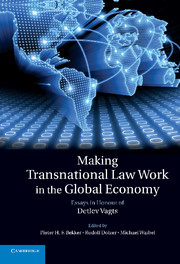Book contents
- Frontmatter
- Contents
- List of contributors
- Foreword: the transnationalism of Detlev Vagts
- List of cases cited
- List of abbreviations and acronyms
- Introduction: a Festschrift to celebrate Detlev Vagts' contributions to transnational law
- 1 Detlev Vagts and the Harvard Law School
- 2 Constructing and developing transnational law: the contribution of Detlev Vagts
- I International law in general
- II Transnational economic law
- 14 Sovereignty-plus in the era of interdependence: toward an international convention on combating human rights violations by Transnational Corporations
- 15 The noisy secrecy: Swiss banking law in international dispute
- 16 Not-for-profit organisations, conflicts of laws and the right of establishment under the EC Treaty
- 17 The meaning of ‘investment’ in the ICSID Convention
- 18 Toward a proper perspective of the private company's distinctiveness
- 19 Administrative law and international law: the encounter of an odd couple
- 20 Making transnational law work through regime-building: the case of international investment law
- 21 Creditor protection in international law
- 22 Stability, integration and political modalities: some American reflections on the European project after the financial crisis
- III Transnational lawyering and dispute resolution
- Bibliography of Detlev Vagts
- Index
22 - Stability, integration and political modalities: some American reflections on the European project after the financial crisis
from II - Transnational economic law
Published online by Cambridge University Press: 17 November 2010
- Frontmatter
- Contents
- List of contributors
- Foreword: the transnationalism of Detlev Vagts
- List of cases cited
- List of abbreviations and acronyms
- Introduction: a Festschrift to celebrate Detlev Vagts' contributions to transnational law
- 1 Detlev Vagts and the Harvard Law School
- 2 Constructing and developing transnational law: the contribution of Detlev Vagts
- I International law in general
- II Transnational economic law
- 14 Sovereignty-plus in the era of interdependence: toward an international convention on combating human rights violations by Transnational Corporations
- 15 The noisy secrecy: Swiss banking law in international dispute
- 16 Not-for-profit organisations, conflicts of laws and the right of establishment under the EC Treaty
- 17 The meaning of ‘investment’ in the ICSID Convention
- 18 Toward a proper perspective of the private company's distinctiveness
- 19 Administrative law and international law: the encounter of an odd couple
- 20 Making transnational law work through regime-building: the case of international investment law
- 21 Creditor protection in international law
- 22 Stability, integration and political modalities: some American reflections on the European project after the financial crisis
- III Transnational lawyering and dispute resolution
- Bibliography of Detlev Vagts
- Index
Summary
To those of us concerned with transnational law, and especially the role of German law on the global stage, it does not need saying that Professor Detlev Vagts is highly deserving of that Germanic and traditional scholarly honour, a Festchrift. (In this context, ‘does not need saying’ of course means ‘should be said repeatedly’.) We all owe Detlev Vagts, and as a Germanic traditionalist, I would be delighted to contribute to this volume on general principle, even if I did not know the man. But I also have personal reasons for wanting to honour Professor Vagts: he taught the basic course in corporations to generations of students at Harvard Law School. In addition, Vagts was one of the advisors to the Ford Fellows Program, which was designed to foster international law teachers. After being one such student and one such fellow, in due course I became a teacher of international and corporation law, so I owe Vagts a double debt of professional gratitude. And, as with so many other young (or once young) scholars, Vagts has been cordially supportive of my efforts to find my way in the academy, for which I am most grateful.
Such things said, however, there is another reason I am happy to have the chance to contribute to this Festschrift. A certain delicacy is called for here, especially since writing for Vagts carries me halfway back to Harvard, where such things are taken so seriously.
- Type
- Chapter
- Information
- Making Transnational Law Work in the Global EconomyEssays in Honour of Detlev Vagts, pp. 453 - 468Publisher: Cambridge University PressPrint publication year: 2010



